Stuck in an endless loop of corruption and violence

Last week was not a good one for those of us involved in academia or academic administration. We hit the press for all the wrong reasons.
We saw helmet-wearing, stick-wielding students of Dhaka University swooping on their opponents as the advanced-guard infantry who fought to retain their campus territory. One would have thought that, after the recent Dhaka College fiasco, sanity would prevail and the ruling party's student wing would not engage in activities that could further smear its party's reputation before the upcoming national election. I have no way of knowing whether these students act on divine instructions or on their own volition, but it seems some student leaders are interested in scoring personal political mileage by strangling the voice of their opponents. Thanks to their over-enthusiastic intervention, an otherwise insignificant rally became national news.
Their action made me reflect on the wise words of the cricketer-turned-politician Mashrafe Mortaza, who pleaded with the party men of his constituency not to unwittingly give in to the wills of the central leaders to "size up" random people. He told them to think twice—e.g. "What is it in for me? Who will face the consequence? Who will feed my family or foot my bills if I go to jail?"—before indulging in violence at the whim of some leaders with remote control.
Last week, we saw police nabbing a member of the board of trustees of a university, who was trying to disgracefully dodge a court order. Four members of the Board of Trustees of North South University (NSU) were sent to jail in a case filed by the Anti-Corruption Commission (ACC) for pilfering Tk 303.82 crore. Their dark infatuation with luxury cars, insistence on an obscene amount of meeting allowances, embezzling funds through the purchase of university land, and corruption in admission have recently come to light.
There are many other "crooks" in the private university sector who, for myriad reasons, have not only vitiated the system, but also choked the growth of higher education in Bangladesh. We have 108 private universities (including some black-listed ones) and 51 public universities and their affiliate colleges to cater to the needs of four million students. The growing demand for higher education has allowed many fraudsters to operate in the market. I use the word "market" with caution, as education today is pitched as an investment. It offers opportunity costs for those students who want to benefit from the educational capital and move up the career ladder. It has also become a profitable commodity for investors. The actions of the latter group have led the overseeing body, the University Grants Commission (UGC), to distrust other noble and philanthropic gestures with which the private sector emerged as a non-profit alternative to the public system. As a result, private universities are getting one after another office orders that go against the spirit of higher education: standardise the curricula, offer cluster admission tests, introduce centralised "unique" ID cards for all private universities, retain just one campus in the officially designated plot; maintain one bank account; no public fund or research grants for the private system; no PhD programme. The list goes on to trim the edges that give the private system its edge and force it to behave more and more like state-run universities. The latest office order to follow the semester system in place of the trimester system is a case in point.
Last week, we also heard that the UGC is currently investigating the misappropriation of funds in three public universities. Earlier, it was reported that they had found allegations against 19 VCs of public universities. The UGC has also set a 60 percent cap on the use of admission fees as remuneration. The issue became scandalous following a report that the faculty and staff members of Jahangirnagar University "shared the spoils" of Tk 8 crore received through the admission process in the 2019-20 session. The UGC has also stopped increments for faculty members with PhDs.
While the board of trustees of some private universities have defiled the trust of their students, the offices of certain public universities (not without the blessings of their political patrons) have tarnished the trust of the taxpayers. This year, the government allocated Tk 10,444 crore for 51 public universities for the next fiscal year. This figure, significantly lower than any of the megaprojects that are making the news, shows the lack of priority given to education. The allocation of Tk 130 crore for research indicates that there are no real incentives for innovation. But more importantly, such meagre allocations can be justified through the acts of mishandling of the higher education system. For instance, we trust military institutions to offer the highest academic degree, but not the private universities with a high concentration of faculty members with PhDs and overseas exposure.
Last week, we also read the sarcastic comments made by Prof Syed Manzoorul Islam, who at a seminar at Dhaka University proposed the establishment of a BCS University where students would simply learn to join the public service sector. Islam knows the importance of the highly competitive exams through which officers are recruited. But his mockery is hinted at the mad rush of joining the government sector as the only objective of higher education.
While the better private universities have realigned their focuses on creating a "whole" education with a 360-degree perspective, the public system has reached the nadir from which students have a tunnel vision of becoming government cadres. I am sure many of these students become officers to dedicate themselves to repaying the debts of the taxpayers who once paid for their education; unfortunately, there are many others who are drawn to the public system for its power base that can be abused for personal gains. The initiation takes place on campuses. That's why wielding sticks while wearing helmets is as important as memorising guide books and specialising in topics that would yield high marks in BCS exams, more than mastering their own disciplines or acquiring essential skills for the job market. Campus corruption and violence are helping other agents to relegate our social role, and grabbing our budgetary allocation. No wonder, civil and military bureaucrats are now leading many academic projects.
I wish last week was different from the other weeks of our academic calendar.
Dr Shamsad Mortuza is the pro-vice-chancellor of the University of Liberal Arts Bangladesh (ULAB).

 For all latest news, follow The Daily Star's Google News channel.
For all latest news, follow The Daily Star's Google News channel. 

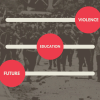
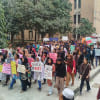
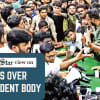
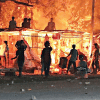
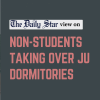


Comments